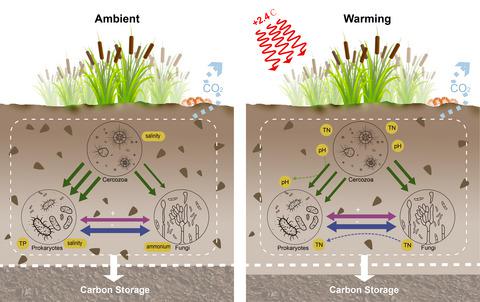当前位置:
X-MOL 学术
›
Glob. Change Biol.
›
论文详情
Our official English website, www.x-mol.net, welcomes your
feedback! (Note: you will need to create a separate account there.)
Warming reshaped the microbial hierarchical interactions
Global Change Biology ( IF 10.8 ) Pub Date : 2021-09-20 , DOI: 10.1111/gcb.15891 Yuqi Zhou 1 , Baoyu Sun 2, 3, 4 , Baohua Xie 2, 4 , Kai Feng 5 , Zhaojing Zhang 1 , Zheng Zhang 1 , Shuzhen Li 5, 6 , Xiongfeng Du 5, 7 , Qi Zhang 1 , Songsong Gu 5 , Wen Song 1 , Linlin Wang 1 , Jianyang Xia 3 , Guangxuan Han 2, 4 , Ye Deng 1, 5, 7
Global Change Biology ( IF 10.8 ) Pub Date : 2021-09-20 , DOI: 10.1111/gcb.15891 Yuqi Zhou 1 , Baoyu Sun 2, 3, 4 , Baohua Xie 2, 4 , Kai Feng 5 , Zhaojing Zhang 1 , Zheng Zhang 1 , Shuzhen Li 5, 6 , Xiongfeng Du 5, 7 , Qi Zhang 1 , Songsong Gu 5 , Wen Song 1 , Linlin Wang 1 , Jianyang Xia 3 , Guangxuan Han 2, 4 , Ye Deng 1, 5, 7
Affiliation

|
Global warming may alter microbially mediated ecosystem functions through reshaping of microbial diversity and modified microbial interactions. Here, we examined the effects of 5-year experimental warming on different microbial hierarchical groups in a coastal nontidal soil ecosystem, including prokaryotes (i.e., bacteria and archaea), fungi, and Cercozoa, which is a widespread phylum of protists. Warming significantly altered the diversity and structure of prokaryotic and fungal communities in soil and additionally decreased the complexity of the prokaryotic network and fragmented the cercozoan network. By using the Inter-Domain Ecological Network approach, the cross-trophic interactions among prokaryotes, fungi, and Cercozoa were further investigated. Under warming, cercozoan–prokaryotic and fungal–prokaryotic bipartite networks were simplified, whereas the cercozoan–fungal network became slightly more complex. Despite simplification of the fungal–prokaryotic network, the strengthened synergistic interactions between saprotrophic fungi and certain prokaryotic groups, such as the Bacteroidetes, retained these phyla within the network under warming. In addition, the interactions within the fungal community were quite stable under warming conditions, which stabilized the interactions between fungi and prokaryotes or protists. Additionally, we found the microbial hierarchical interactions were affected by environmental stress (i.e., salinity and pH) and soil nutrients. Interestingly, the relevant microbial groups could respond to different soil properties under ambient conditions, whereas under warming these two groups tended to respond to similar soil properties, suggesting network hub species responded to certain environmental changes related to warming, and then transferred this response to their partners through trophic interactions. Finally, warming strengthened the network modules’ negative association with soil organic matters through some fungal hub species, which might trigger soil carbon loss in this ecosystem. Our study provides new insights into the response and feedback of microbial hierarchical interactions under warming scenario.
中文翻译:

变暖重塑了微生物的等级相互作用
全球变暖可能会通过重塑微生物多样性和改变微生物相互作用来改变微生物介导的生态系统功能。在这里,我们研究了 5 年实验性变暖对沿海非潮汐土壤生态系统中不同微生物等级群体的影响,包括原核生物(即细菌和古细菌)、真菌和 Cercozoa,这是一种广泛的原生生物门。变暖显着改变了土壤中原核和真菌群落的多样性和结构,此外还降低了原核网络的复杂性,并使尾动物网络支离破碎。通过使用域间生态网络方法,进一步研究了原核生物、真菌和动物之间的跨营养相互作用。在变暖下,尾蚴-原核生物和真菌-原核生物二分网络被简化,而尾蚴-真菌网络变得稍微复杂一些。尽管简化了真菌-原核生物网络,但腐生真菌与某些原核生物群(如拟杆菌)之间增强的协同相互作用在变暖下仍将这些门保留在网络中。此外,在变暖条件下真菌群落内的相互作用非常稳定,这稳定了真菌与原核生物或原生生物之间的相互作用。此外,我们发现微生物等级相互作用受环境压力(即盐度和 pH 值)和土壤养分的影响。有趣的是,相关微生物群在环境条件下可以对不同的土壤特性做出反应,而在变暖的情况下,这两组倾向于对相似的土壤特性做出反应,建议网络枢纽物种对与变暖相关的某些环境变化做出反应,然后通过营养相互作用将这种反应传递给它们的伙伴。最后,变暖通过一些真菌枢纽物种加强了网络模块与土壤有机质的负相关,这可能会引发该生态系统中的土壤碳流失。我们的研究为变暖情景下微生物分层相互作用的响应和反馈提供了新的见解。
更新日期:2021-11-12
中文翻译:

变暖重塑了微生物的等级相互作用
全球变暖可能会通过重塑微生物多样性和改变微生物相互作用来改变微生物介导的生态系统功能。在这里,我们研究了 5 年实验性变暖对沿海非潮汐土壤生态系统中不同微生物等级群体的影响,包括原核生物(即细菌和古细菌)、真菌和 Cercozoa,这是一种广泛的原生生物门。变暖显着改变了土壤中原核和真菌群落的多样性和结构,此外还降低了原核网络的复杂性,并使尾动物网络支离破碎。通过使用域间生态网络方法,进一步研究了原核生物、真菌和动物之间的跨营养相互作用。在变暖下,尾蚴-原核生物和真菌-原核生物二分网络被简化,而尾蚴-真菌网络变得稍微复杂一些。尽管简化了真菌-原核生物网络,但腐生真菌与某些原核生物群(如拟杆菌)之间增强的协同相互作用在变暖下仍将这些门保留在网络中。此外,在变暖条件下真菌群落内的相互作用非常稳定,这稳定了真菌与原核生物或原生生物之间的相互作用。此外,我们发现微生物等级相互作用受环境压力(即盐度和 pH 值)和土壤养分的影响。有趣的是,相关微生物群在环境条件下可以对不同的土壤特性做出反应,而在变暖的情况下,这两组倾向于对相似的土壤特性做出反应,建议网络枢纽物种对与变暖相关的某些环境变化做出反应,然后通过营养相互作用将这种反应传递给它们的伙伴。最后,变暖通过一些真菌枢纽物种加强了网络模块与土壤有机质的负相关,这可能会引发该生态系统中的土壤碳流失。我们的研究为变暖情景下微生物分层相互作用的响应和反馈提供了新的见解。











































 京公网安备 11010802027423号
京公网安备 11010802027423号